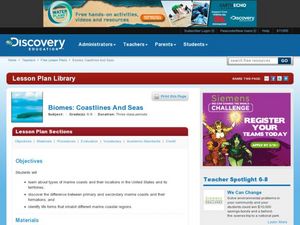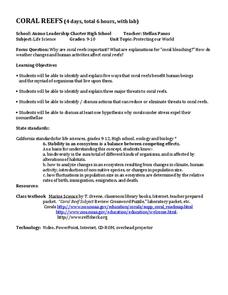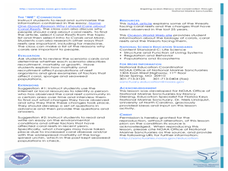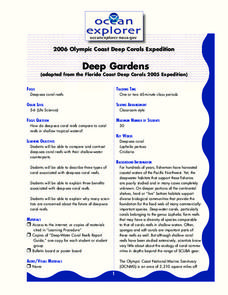Curated OER
Filter-Feeding in Reef Sponges
Students make observations and describe the filter-feeding in sponges as it relates to the ecological role of sponges on coral reefs. In this filter-feeding in reef sponges lesson, students are introduced to the feeding methods of...
Curated OER
Biomes: Coastlines and Seas
Students study the different types of coastlines and their territories. In this marine coasts lesson students identify life forms that are in the coastal regions.
Curated OER
Guess Who? Coral
Fourth graders identify and group coral formations. In this coral identification lesson, 4th graders examine coral pictures, discuss vocabulary, and provide similarities and differences in the growth formations.
Curated OER
Introduction to Ocean Grazers
Students explore biology by creating a poster with classmates. In this oceanography lesson, students identify the importance of coral reefs to the ocean's ecology and examine a food web of ocean animals. Students define a list of...
Curated OER
Plant and Animal Cells
Students investigate parts of a cell. In this plant cell lesson plan, students determine the difference between plant and animal cells. Students discover that coral is an animal based on cell characteristics. Students create puppets to...
Curated OER
Growing A Coral Skeleton
Learners research the growth of coral. In this coral polyps lesson, students simulate the growth of coral by using available materials to grow crystals. Learners record observations in a scientific journal.
Curated OER
Coral Reef Community
Students explore the coral reef. In this food chain lesson, students study the plants and animals of the coral reef and how they each play a role in that ecosystem. They participate in a class play to demonstrate the types of animals in...
Curated OER
Build a Polyp
Young scholars research coral polyps. In this coral polyps lesson, students discover the anatomy of a coral polyp and how they feed. Young scholars create an edible coral polyp model.
Curated OER
Corrosion to Corals
Students study galvanic exchange and how it produces electric currents. In this ocean lesson students predict what metals deteriorate in salt water.
Curated OER
Treasures in Jeopardy
Learners study how coral reefs can be protected from humans and their activities. In this conservation lesson students explain the benefits of coral reefs and what humans can do to help protect them.
Curated OER
What's Down There
Students write an essay about the coral reefs. In this oceanography lesson plan, students investigate the reef of Bonaire and compare it to reefs that are not thriving. Students then explore the differences that contribute to the...
Curated OER
Deep Gardens
Students compare and contrast deep-sea coral reefs with shallow-water coral reefs. In this underwater ecology lesson, students describe three types of coral and explain why scientists are concerned about the future of deep-sea coral.
Curated OER
Who Has the Data? Monitoring Coral Reefs
Young scholars access data to characterize coral reefs. In this scientific research lesson plan, students access data and explain the need for such data when monitoring coral reefs. They will identify and explain three major threats to...
Curated OER
Coral Reefs
Young scholars research coral reefs and identify their benefits to humans, threats to the reef, how to reduce and eliminate threats, and more. In this coral reef lesson plan, students research the reefs, and take a field trip to an...
Curated OER
We're All In This Together
Students discover what a coral reef is and the animals that live there. In this ecosystem lesson plan, students act out a story with ocean organisms. They answer questions that show the interdependency of the sea animals.
Curated OER
Architects of the Coral Reef
Students discuss reproduction in Cnidaria. in this coral reef lesson, students describe five characteristics of Cnidaria and compare and contrast the four classes. They describe the reproduction strategies they use.
Curated OER
How do living and non-living structures affect coral reef habitats?
Students create model coral reefs showing surface area and including examples of communities. In this coral reef lesson, students research and explore the functions or benefits from a coral reef. Students design a benthic habitat....
Curated OER
Design a Reef!
Students explore coral reef ecosystems. In this ecosystems science lesson, students research coral reef ecosystems to determine the major functions the participating organisms must perform. Students construct a miniature coral reef...
Curated OER
Keeping Watch on Coral Reefs
Students investigate the dangers Coral Reefs face by investigating satellite images. In this environmental protection activity, students utilize the Internet to discover the types of satellites and sensors used to provide oceanographic...
Curated OER
The Changing Coral Reef
Students record changes in the composition of a coral reef. In this Coral Reef activity, students recognize the needs of Coral Reef species to survive. Students chart changes in population over time. Students write an essay about...
Curated OER
Saved by a Shark
Students explore the marine ecosystem and the importance of sharks. In this shark lesson, students look at photos of the Flower Garden Banks National Marine Sanctuary and discuss the animals that live there. They discuss which animals...
Curated OER
Deep Gardens
Students investigate the differences and similarities between shallow-water and deep-sea coral reefs. In this coral reef lesson, students research and compare the characteristics of reefs. Students describe various lifeforms in coral...
Curated OER
Monitoring Coral Reefs
Students investigate data on coral reef monitoring in a marine protected area in the Florida keys. In this coral reef lesson plan, students use online data from a marine protected coral reef to complete a worksheet about coral...
Curated OER
Biotic and Abiotic Factors
In this biotic and abiotic factors learning exercise, students complete 20 various types of questions related to biotic and abiotic factors. First, they write the vocabulary word that best completes the sentence. Then, students state an...

























